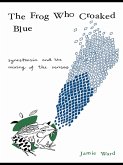Advances in the Study of Behavior, Volume 54 highlights new advances in the field, with this new volume presenting interesting chapters on Mobbing in animals: a thorough review and proposed future directions, Learned components of courtship: a focus on gestures, choreographies and construction abilities, Sexual selection in the true bugs, and Brain-behavior relationships of cognition in vertebrates: lessons from amphibians, Pre-Copulatory and Copulatory Courtship in Male-Dimorphic Arthropods.
- Provides the authority and expertise of leading contributors from an international board of authors
- Presents the latest release in Advances in the Study of Behavior
- Updated release includes the latest information on Advances in the Study of Behavior
Dieser Download kann aus rechtlichen Gründen nur mit Rechnungsadresse in A, B, BG, CY, CZ, D, DK, EW, E, FIN, F, GR, HR, H, IRL, I, LT, L, LR, M, NL, PL, P, R, S, SLO, SK ausgeliefert werden.









